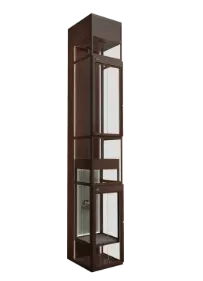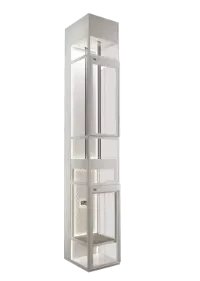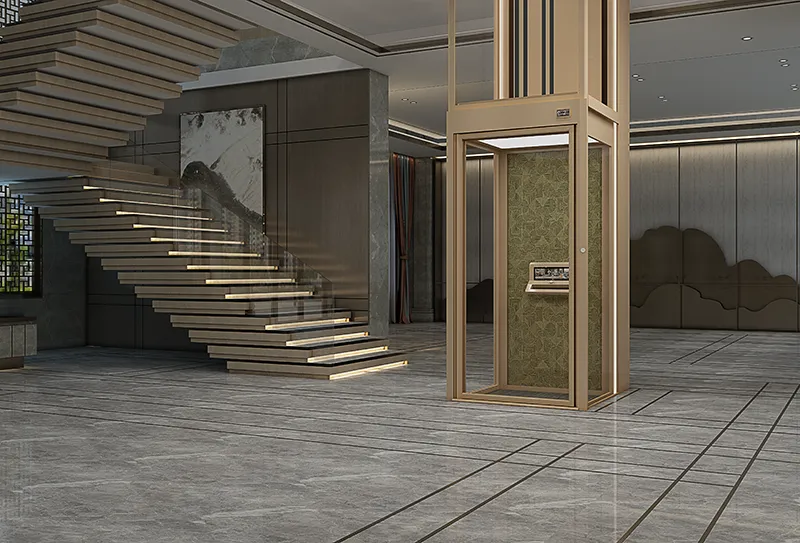The home lift for 2 person, as a pivotal vertical mobility solution, is reshaping global residential experiences through technological innovation and design optimization. Its advancements not only meet the convenience needs of households but also exemplify energy efficiency, intelligence, and aesthetic integration.
Technological Innovation: Drive Systems and Intelligence
The evolution of home lifts for 2 persons focuses on diversified drive systems and smart controls. Traditional traction elevators are being replaced by screw-driven and hydraulic systems. For instance, China’s Longchuang Elevator’s “Smart Dual Engine”series combines traction and screw drives, achieving a 300kg load capacity and 0.4m/s speed for multi-story homes.
IoT and AI further enhance user experience. Sweden’s Cibes Symmetry enables remote monitoring via apps, with 92% predictive maintenance accuracy and 40% faster fault response. Shandong Bensu Elevator’s patented machine learning algorithm adjusts operation modes based on usage patterns, cutting energy use by 15%.

Design Trends: Space Efficiency and Accessibility
The design of home lifts for 2 persons balances space constraints and functionality. Shanghai Mitsubishi’s research shows a minimum shaft size of 1m² (600mm×880mm) with 2m internal height, accommodating wheelchairs and family members2. Savaria’s “Stepless” series eliminates pit excavation, enabling installation within 24 hours.
Aging populations drive accessibility. Otis’s “Compass” series in the U.S. features 800mm door widths and emergency call systems, while Japan’s compact lifts (250kg) use folding doors for space efficiency.

Market Drivers: Aging Populations and Urbanization
Global aging trends fuel demand. The U.S. population aged 65+ is projected to reach 94.7 million by 2060, driving an 8.5% annual growth in home lifts. China’s 14th Five-Year Plan prioritizes aging-friendly renovations, with 30% of 41,000 upgraded elevators being two-person models.
Smart home integration expands market potential. The smart elevator market is expected to grow from 11 billionin 2024 to 25 billion by 2030. Thyssenkrupp’s MAX system uses AI to boost peak-hour capacity by 35%.

Regional Dynamics: Standards and Preferences
Global markets exhibit distinct priorities:
Europe: Energy efficiency dominates. The EU’s EPBD mandates 30% elevator upgrades by 2030, spurring modular solutions like Schindler’s PORT technology (72-hour installation).
North America: Healthcare compliance drives demand. ASME A17.1 requires ≥140kg loads and integrated safety sensors.
Asia-Pacific: High-density innovation thrives. Mumbai’s “shared lift” project serves slum communities at one-third traditional costs.
Sustainability: Circular Economy and Carbon Reduction
Under net-zero goals, home lifts for 2 persons prioritize energy efficiency. KONE’s SolarLift feeds 20% of energy back to grids, halving lifecycle emissions. EU regulations mandate 90% component recyclability, promoting modular designs and 3D-printed localization.
Future Trends: Convergence and Smart Ecosystems
Future home lifts for 2 persons will evolve into data hubs. Microsoft and Schindler’s digital twins simulate extreme conditions, cutting maintenance costs by 18%. Smart textiles (e.g., self-cleaning glass) and AI predictive dispatch will redefine user experience and efficiency.
The home lift for 2 person’s global evolution signifies not only technological miniaturization but also a tailored response to urbanization and aging. From European circular economies to Asian efficiency-driven innovations, its trajectory underscores vertical mobility’s role as a catalyst for sustainable living.





